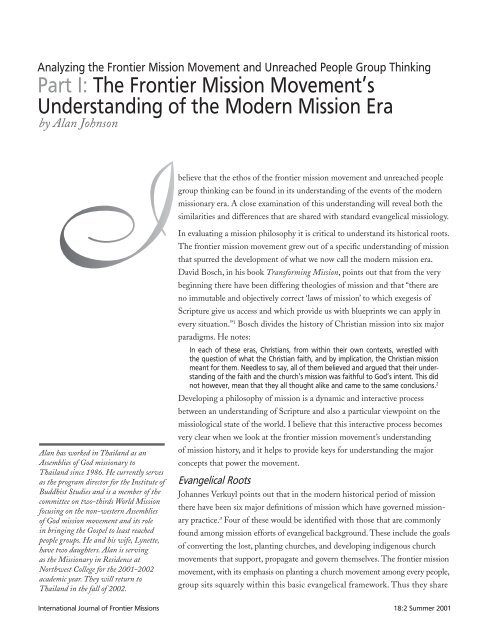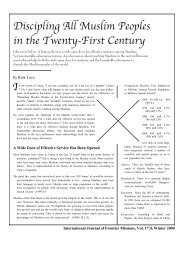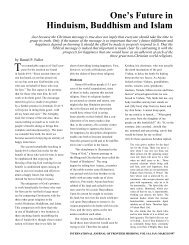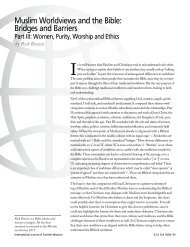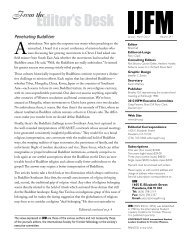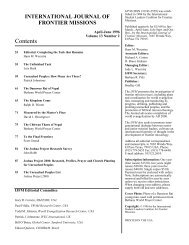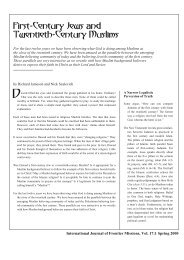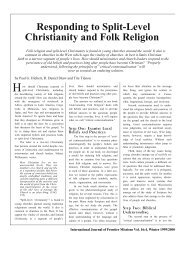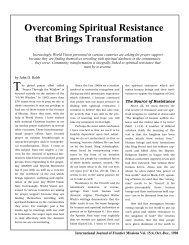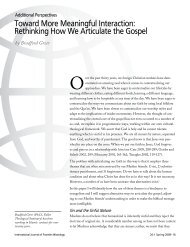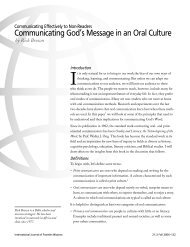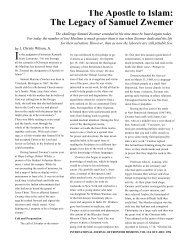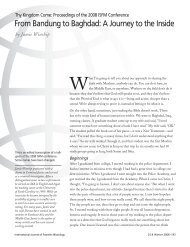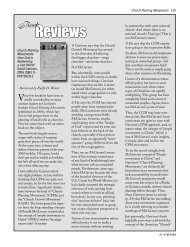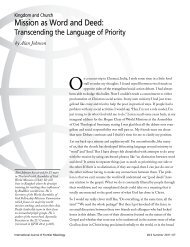Volume 18:2 - International Journal of Frontier Missions
Volume 18:2 - International Journal of Frontier Missions
Volume 18:2 - International Journal of Frontier Missions
You also want an ePaper? Increase the reach of your titles
YUMPU automatically turns print PDFs into web optimized ePapers that Google loves.
Analyzing the <strong>Frontier</strong> Mission Movement and Unreached People Group Thinking<br />
Part I: The <strong>Frontier</strong> Mission Movement’s<br />
Understanding <strong>of</strong> the Modern Mission Era<br />
by Alan Johnson<br />
I<br />
Alan has worked in Thailand as an<br />
Assemblies <strong>of</strong> God missionary to<br />
Thailand since 1986. He currently serves<br />
as the program director for the Institute <strong>of</strong><br />
Buddhist Studies and is a member <strong>of</strong> the<br />
committee on two-thirds World Mission<br />
focusing on the non-western Assemblies<br />
<strong>of</strong> God mission movement and its role<br />
in bringing the Gospel to least reached<br />
people groups. He and his wife, Lynette,<br />
have two daughters. Alan is serving<br />
as the Missionary in Residence at<br />
Northwest College for the 2001-2002<br />
academic year. They will return to<br />
Thailand in the fall <strong>of</strong> 2002.<br />
believe that the ethos <strong>of</strong> the frontier mission movement and unreached people<br />
group thinking can be found in its understanding <strong>of</strong> the events <strong>of</strong> the modern<br />
missionary era. A close examination <strong>of</strong> this understanding will reveal both the<br />
similarities and differences that are shared with standard evangelical missiology.<br />
In evaluating a mission philosophy it is critical to understand its historical roots.<br />
The frontier mission movement grew out <strong>of</strong> a specific understanding <strong>of</strong> mission<br />
that spurred the development <strong>of</strong> what we now call the modern mission era.<br />
David Bosch, in his book Transforming Mission, points out that from the very<br />
beginning there have been differing theologies <strong>of</strong> mission and that “there are<br />
no immutable and objectively correct ‘laws <strong>of</strong> mission’ to which exegesis <strong>of</strong><br />
Scripture give us access and which provide us with blueprints we can apply in<br />
every situation.” 1 Bosch divides the history <strong>of</strong> Christian mission into six major<br />
paradigms. He notes:<br />
In each <strong>of</strong> these eras, Christians, from within their own contexts, wrestled with<br />
the question <strong>of</strong> what the Christian faith, and by implication, the Christian mission<br />
meant for them. Needless to say, all <strong>of</strong> them believed and argued that their understanding<br />
<strong>of</strong> the faith and the church’s mission was faithful to God’s intent. This did<br />
not however, mean that they all thought alike and came to the same conclusions. 2<br />
Developing a philosophy <strong>of</strong> mission is a dynamic and interactive process<br />
between an understanding <strong>of</strong> Scripture and also a particular viewpoint on the<br />
missiological state <strong>of</strong> the world. I believe that this interactive process becomes<br />
very clear when we look at the frontier mission movement’s understanding<br />
<strong>of</strong> mission history, and it helps to provide keys for understanding the major<br />
concepts that power the movement.<br />
Evangelical Roots<br />
Johannes Verkuyl points out that in the modern historical period <strong>of</strong> mission<br />
there have been six major definitions <strong>of</strong> mission which have governed missionary<br />
practice. 3 Four <strong>of</strong> these would be identified with those that are commonly<br />
found among mission efforts <strong>of</strong> evangelical background. These include the goals<br />
<strong>of</strong> converting the lost, planting churches, and developing indigenous church<br />
movements that support, propagate and govern themselves. The frontier mission<br />
movement, with its emphasis on planting a church movement among every people,<br />
group sits squarely within this basic evangelical framework. Thus they share<br />
<strong>International</strong> <strong>Journal</strong> <strong>of</strong> <strong>Frontier</strong> <strong>Missions</strong> <strong>18</strong>:2 Summer 2001


